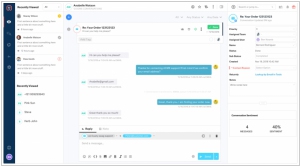Kustomer vs Salesforce
June 08, 2023 | Author: Sandeep Sharma
75

Most-popular CRM. Easy collaboration. Proven cloud platform. Salesforce.com offers everything you need to transform your business into a Social Enterprise, so you can connect to customers and employees like never before. With no software or hardware to install, you're up and running—and seeing a positive impact on your business—quickly.
Kustomer and Salesforce are both customer relationship management (CRM) platforms that offer comprehensive solutions for managing customer interactions and relationships. However, they differ in various aspects, including their focus, features, and target markets.
Kustomer is known for its emphasis on delivering personalized and efficient customer support. It consolidates customer data from multiple channels, providing a unified view of customer interactions and enabling agents to deliver tailored and contextualized support. Kustomer's platform offers features like case management, ticketing, automation, and integration with various communication channels, allowing businesses to streamline their customer service operations.
Salesforce, on the other hand, is a widely recognized and feature-rich CRM platform that caters to various business functions beyond customer support. It offers a comprehensive suite of tools for sales, marketing, service, and analytics, making it suitable for businesses that require a holistic CRM solution. Salesforce provides extensive customization options, integration capabilities, and a robust ecosystem of third-party applications, empowering businesses to optimize their entire customer lifecycle management.
See also: Top 10 Helpdesk software
Kustomer is known for its emphasis on delivering personalized and efficient customer support. It consolidates customer data from multiple channels, providing a unified view of customer interactions and enabling agents to deliver tailored and contextualized support. Kustomer's platform offers features like case management, ticketing, automation, and integration with various communication channels, allowing businesses to streamline their customer service operations.
Salesforce, on the other hand, is a widely recognized and feature-rich CRM platform that caters to various business functions beyond customer support. It offers a comprehensive suite of tools for sales, marketing, service, and analytics, making it suitable for businesses that require a holistic CRM solution. Salesforce provides extensive customization options, integration capabilities, and a robust ecosystem of third-party applications, empowering businesses to optimize their entire customer lifecycle management.
See also: Top 10 Helpdesk software
Kustomer vs Salesforce in our news:
2023. Salesforce to acquire Airkit.ai, a low-code platform for building AI customer service agents
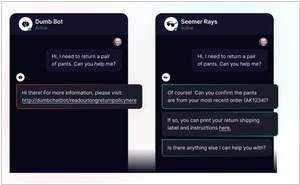
Salesforce is set to acquire Airkit.ai, a low-code platform designed to assist e-commerce enterprises in constructing AI-driven customer service agents. Initially conceived as a self-serve customer engagement platform, Airkit facilitated the integration of data silos and addressed various use cases like user onboarding. However, in a recent rebranding move, the company transformed into Airkit.ai and unveiled its inaugural integrated product, a GPT-4-powered platform enabling businesses like OpenTable and ShipBob to develop customized customer service chatbots capable of handling inquiries related to order status, refunds, product information, and more.
2023. Salesforce launches AI Cloud to bring models to the enterprise
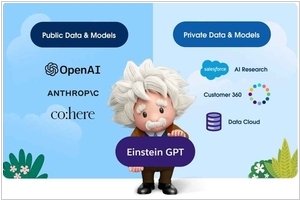
Salesforce is introducing a new collection of products with the goal of strengthening its position in the highly competitive field of AI. This suite, known as AI Cloud, consists of tools that are designed to provide AI solutions that are suitable for enterprise use. It represents Salesforce's latest effort to enhance its product lineup with AI capabilities across different disciplines. The launch of AI Cloud builds upon the company's previous generative AI initiative, which was introduced in March, aiming to incorporate generative AI throughout the entire Salesforce platform. AI Cloud serves as a hosting and delivery platform for AI models, specifically those focused on generating text, from a variety of partners such as Amazon Web Services, Anthropic, Cohere, and OpenAI. Additionally, Salesforce's own AI research division offers first-party models that power features like code generation and business process automation. Customers also have the option to bring their own custom-trained models to the platform while storing their data on their own infrastructure.
2023. Kustomer, the CRM startup acquired by Meta last year for $1B, spins out
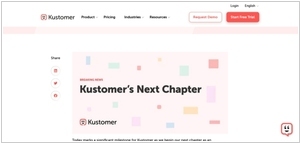
Facebook has officially spun out Kustomer, the CRM startup it acquired last year for around $1 billion. The existence of potential buyers for Kustomer remains uncertain; however, Meta has opted to retain a minority stake in the CRM business. This allows Meta the flexibility to collaborate with Kustomer in further product development and continue servicing any clients acquired during Meta's ownership tenure. With the ongoing race in generative AI and the introduction of new innovations, both Meta and Kustomer have the potential to create and integrate intriguing tools across Meta's platforms. However, the extent of their existing collaborative business remains unclear. Initially, Kustomer aimed to revolutionize CRM by adopting an "omni-channel" approach to customer contact. According to Kustomer, traditional CRMs did not align with how modern consumers and potential customers interact with businesses today.
2020. Salesforce announces new Service Cloud workforce planning tool
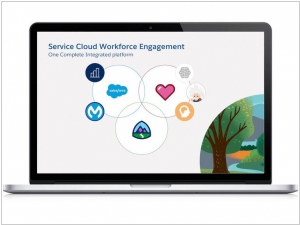
With a pandemic wreaking havoc in various parts of the globe, numerous companies are confronted with the challenge of managing dispersed customer service agents, leading to a complex workforce management situation. To address this issue, Salesforce is in the process of developing a new product called Service Cloud Workforce Engagement. Much like other Salesforce offerings, this solution comprises several crucial elements that work together to provide a comprehensive answer. Firstly, there is Service Forecast for Customer 360, a tool that utilizes AI to anticipate workforce requirements and intelligently allocate customer service requests. Furthermore, there is Omnichannel Capacity Planning, which aids managers in assigning customer service agents to channels like phone, messaging, or email based on the prevailing demand. Lastly, there is a training component designed to coach customer service agents on delivering accurate and appropriate responses tailored to specific situations.
2020. Salesforce applies AI to workflow with Einstein Automate
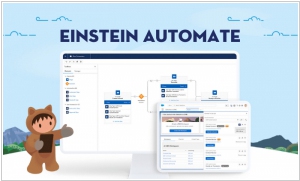
Salesforce has unveiled Einstein Automate, a new collection of workflow solutions powered by artificial intelligence (AI). Einstein serves as Salesforce's AI platform, encompassing all aspects of the company's product portfolio. It introduces automation to various tasks and simplifies the process of extracting valuable customer information, which often gets buried within vast amounts of data. Furthermore, Salesforce is incorporating MuleSoft, an integration company it acquired for $6.5 billion in 2018, into its offerings. This integration enables IT professionals to effortlessly build intricate connections between applications across the enterprise and the Salesforce suite of products, enhancing processes like mortgage approval workflows and more.
2020. Facebook buys Kustomer for $1B
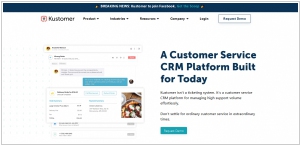
Facebook has recently made the decision to acquire Kustomer, a startup that aimed to revolutionize the customer service industry by offering agents enhanced data and a comprehensive overview of users through the integration of various social media and communication channels. This acquisition aligns with Facebook's strategy of expanding its customer service offerings on the platform. The company plans to further strengthen its position by introducing an advanced platform that goes beyond existing capabilities, potentially as a paid service. As Facebook faces increasing competition from platforms like Snapchat and TikTok, having an enhanced product to offer businesses, in addition to its existing services, will enable Facebook to foster stronger ties within the Facebook ecosystem.
2020. Salesforce beefing up field service offering with AI
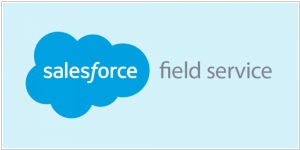
Salesforce is introducing AI-powered enhancements to its field service offerings, leveraging the capabilities of artificial intelligence. One of the key additions is Dynamic Priority, which allows the machine to set repair priorities based on factors such as service agreement type and criticality, streamlining call organization and enabling dispatchers to focus on other tasks. Furthermore, Salesforce aims to provide customers with a similar experience to tracking a driver's progress in a rideshare app. The introduction of Appointment Assistant, a new application, empowers customers to track the arrival time of their assigned repair person, ensuring they are aware of when to expect them.
2020. Salesforce announces a new mobile collaboration tool for sales called Anywhere
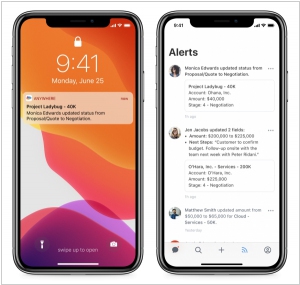
Salesforce has introduced a new tool called Salesforce Anywhere with the purpose of facilitating collaboration and data sharing among teams, regardless of their location. Recognizing the increasing significance of collaboration in a digital environment during the pandemic, the development of such an application became crucial for the company. The primary objective is to go beyond the confines of a traditional database and enable salespeople to access the most relevant information based on their sales pipelines. This tool allows employees to share information within their teams and engage in discussions related to that specific data. While there are other chat tools available, Salesforce Anywhere is specifically tailored for sharing Salesforce data, distinguishing it from more general-purpose platforms like Slack or other business chat tools.
2020. Kustomer acquires Reply.ai to enhance chatbots on its customer service CRM
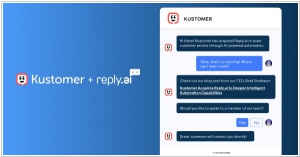
CRM startup Kustomer has announced its acquisition of Reply.ai, a Madrid-based startup. Reply.ai has developed a code-free platform that enables companies to create customized chatbots for efficient handling of customer service inquiries. These chatbots utilize machine learning to continuously improve their responses over time. Reply.ai's impressive client roster includes renowned brands such as Coca-Cola, Starbucks, Samsung, and several prominent retailers, ad agencies, and marketing agencies. By acquiring Reply.ai, Kustomer aims to challenge industry giants like Salesforce, Zendesk, and Oracle in the CRM space. Kustomer's platform empowers human agents to effectively manage inbound omnichannel customer requests, setting it apart as a comprehensive solution.
2018. Salesforce allows to enter data to CRM via voice
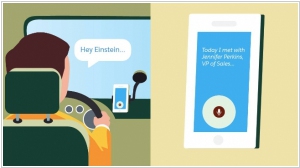
Sales managers are renowned for their verbal prowess, as talking is an integral part of their job. However, when it comes to entering customer data into a CRM system, they are faced with the arduous task of typing. Salesforce aims to alleviate this cognitive dissonance by introducing a new feature called Einstein Voice. This feature enables users to input data into the system effortlessly using natural speech. Just imagine, you hop into your car, open the mobile app, and have a conversation with a virtual assistant. You might say, "I just had a meeting with John Smith. He expressed interest in making a purchase but requested a follow-up call in a week...". The virtual assistant then dutifully adds a note to the customer's history in the CRM system. However, Salesforce might need to address the personality of their virtual assistant. It seems incongruous to task Einstein with such mundane responsibilities.

